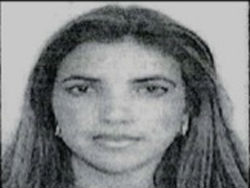A United States judge has sentenced one of Guatemala’s most notorious money launderers behind closed doors, adding intrigue to a story already filled with mystery and alleged high-level collusion from inside Guatemala’s presidency.
On May 5, Judge Jose Martinez of the US District Court of Southern Florida sentenced Marllory Chacon Rossell, known as the “Queen of the South,” to an undisclosed prison term, reported elPeriodico. Due to the sensitivity of the case, Martinez closed the courtroom during the hearing and put the sentencing under seal for five years, according to the AFP.
However, in December prosecutors recommended the court rule towards the lower end of a sentence that could range from 10 years to life in prison, because of Chacon’s cooperation with US authorities.
That cooperation has played a central role in a long-running saga of rumors and allegations that Chacon is connected to Guatemala’s political elites and that she may be helping US prosecutors build a case against those who were once her allies.
In 2012, the US Treasury department identified Chacon as one of the most prolific drug traffickers in Central America, as well as Guatemala’s “most active money launderer.” According to the Treasury, Chacon ran a drug trafficking organization (see image below) based in Guatemala that also operated in Panama and Honduras, which supplied thousands of kilos of cocaine per month to Mexican drug cartels, including the Zetas.

Despite — or perhaps because of — her status as a powerful money launderer, Chacon was known to run in some of the same circles as Guatemala’s political and business elite. During an interview with Prensa Libre in May 2014, Chacon admitted she had met Vice President Roxanna Baldetti, before adding she has “no relation with her.” Baldetti has vehemently denied accusations that she has ties to Chacon.
In September of last year, Chacon handed herself over to US authorities in Miami, after much speculation she had been arrested in the Bahamas months earlier. In December, she pleaded guilty to drug trafficking.
InSight Crime Analysis
Despite the sealed sentence, all signs suggest Chacon has thoroughly cooperated with US authorities and received a greatly reduced sentence.
Still, there is no reason to believe, as of now, that Chacon has implicated any political contacts in Guatemala. In fact, Chacon’s cooperation was more likely focused on helping authorities capture several high profile figures that operated from Central America and Mexico.
These may have included various members of a drug trafficking network based in Honduras run by Cesar Gastelum Serrano, alias “La Señora.” Gastelum Serrano was captured in April, capping the rapid decimation of a network that was believed to be the Sinaloa Cartel’s key operational node in Central America.
Her information also appears to have assisted in the capture of Hayron Borrayo Lasmibat, a high-level Guatemalan trafficker who was the go-between for the Zetas and Colombian cocaine traffickers for years.
The judge’s decision to close the doors during sentencing may have had as much or more to do with these cases than with anything Chacon might say about Guatemala’s political elites.
To be sure, cases against political behemoths like Baldetti are a whole different ballgame.
First, US prosecutors have to believe they can make a case against these politicians in the United States. This is not easy. Politicians might steal from their own countrymen, but they are not likely to traffic in illegal substances or launder drug money using the US banking system.
Second, prosecutors are unlikely to bring charges against a sitting vice president (or president) because of the political firestorm it would entail. Baldetti may become more vulnerable once she leaves office after Guatemala’s presidential elections this September, but US prosecutors will probably still be hesitant to bring her to court as it would almost surely entail a diplomatic fallout.
What’s more, she may gain immunity by obtaining another political post, such as becoming a representative of the Central American Parliament, one of the most oft-used tactics by corrupt politicians to escape scrutiny following their tainted times in office.
SEE ALSO: Coverage of Elites and Organized Crime
The case of former Haitian President Jean Bertrand-Aristide serves as a good precedent for Baldetti’s situation. Aristide allegedly maintained a close relationship with a drug trafficker whose network facilitated the shipment of cocaine into the United States, but US prosecutors never brought charges against the former president despite prosecuting some of his alleged accomplices.
Former Colombian President Alvaro Uribe has also come under scrutiny for his family’s alleged ties to drug traffickers and right-wing paramilitaries. Like the cases of Baldetti and Aristide, there are numerous alleged accomplices in United States prisons with a vast knowledge of Uribe’s family businesses and backroom political deals. However, US prosecutors have never shown any real interest in pursuing a case against the now Colombian senator.
The one exception to this rule was Gen. Manuel Noriega. The US indicted the former Panamanian dictator while he was still head of state in 1988. However, Noriega was an international pariah and eventually, a US military objective during a US invasion of that country.
The trend is clear. And for now, Baldetti is probably in the clear.
*The research presented in this article is, in part, the result of a project funded by Canada’s International Development Research Centre (IDRC). Its content is not necessarily a reflection of the positions of the IDRC. The ideas, thoughts and opinions contained in this document are those of the author or authors.


